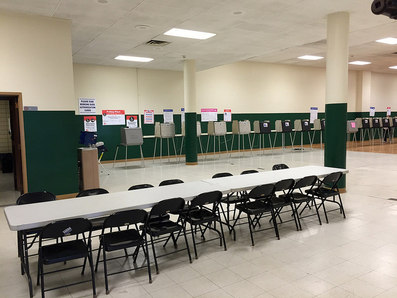
Not a being a resident of Utah’s fourth congressional district, he faced a ballot with no real races. His choices consisted mainly of candidates with either no opposition or a token opponent who couldn’t be taken seriously. His only real choices involved three statewide constitutional issues.
Looking around the country, this sounds
| | like a common story. President Obama invoked a lot of head scratching after the election by saying he not only heard the voters, he also heard the “two-thirds of voters who chose not to participate in the process.” No one is quite sure what he heard those people say. Not voting could be a sign of protest. More likely, it is a sign of not caring, or of cynicism. But if Americans are casting votes with something other than traditional ballots, perhaps it is with their moving vans. Lane Filler of Newsday postulated this week, Americans are “clustering.” This is “when people who look, think, earn and spend alike live together in companionable, boring harmony.” Urban centers attract a certain type of person. Suburbs attract a different type. The Washington Post disputed that idea in 2012 with an analysis that showed most of America is purple, not all red or blue. But then, the author of that piece, George Washington University professor John Sides, used an interesting notion to illustrate his point. “Provo is not Berkeley…” he said. “The point is that most Americans don’t live in Provo or Berkeley. Most of us live in places that are, politically speaking, somewhere in between.” But in Utah, more of us seem to live in Provo than in Berkeley or any place between. That can lead to a boring, predictable political process. Of course, Republics do not exist to entertain us with intriguing choices that always fall neatly along ideological lines. Nor do they always give us candidates who match perfectly with our own philosophies. As in many other aspects of life, the decision involves information-gathering and compromises. The ballot in November is the end result of a long process that begins months earlier and offers opportunities for public input and participation. If nothing else, we vote to honor that system by making an informed choice we feel is the best among the options presented. But all of that can sound like hokum in the face of an almost overwhelming public apathy, and when the ballot contains hardly any choices at all. By some measures, last Tuesday’s election attracted the lowest turnout since WWII, when a good deal of the electorate was busy trying to save the world. When you look at the percentage of registered voters who cast ballots, Utah’s turnout was 40 percent. But if you look at the percentage of eligible voters, or the number of adult citizens old enough to vote, regardless of whether they are registered, Utah’s turnout dropped to 28.8 percent, according to the United States Election Project. Utah did not have the lowest percentage. Indiana had that honor with 28 percent. But it was solidly in the neighborhood. Trying to increase voter participation can be harder than getting friends to help you move on Saturday morning. In Utah, one can vote by mail, vote early on electronic machines at several locations, and even register (in five counties this time) on Election Day. Convenience isn’t an issue. Getting on the ballot can be an issue, but lawmakers recently passed SB54, which, if it survives a legal challenge, will let candidates get on primary ballots through a petition, bypassing the normal party convention process. But, for all that, it may be, as Filler notes, “Most folks care about politics the way my wife cares about pro football: Only the really big games are worthy of attention…” I’ve heard from readers who say that’s OK. Let the informed people vote, even if their numbers are few. Sure, no one wants an uninformed person to vote. But having 28 percent of the people decide for everyone else just doesn’t seem like the idea way to govern a society. |

 RSS Feed
RSS Feed

